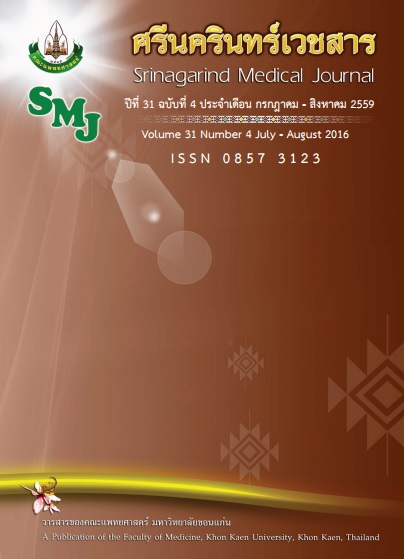Maternal Knowledge and Attitude on Folic Acid Intakes to Prevent Birth Defects of Pregnant Women
Keywords:
Folic acid, Knowledge and attitudes, Pregnant women.Abstract
Backgroundand Objective: At present, it is recommended to intake folic acid 1-3 months before pregnancy and 3 months after pregnancy. For prevent birth defects , especially nevral tube defects, we need to know the knowledge’s and attitudes of pregnant women in order to identify problems and solutions. The objective of this intregrated study is to evaluate maternal knowledge and attitude on folic acid intakes to prevent birth defects.
Methods: A descriptive study was performed in Antenatal care clinic at Srinagarind hospital during August 2013 to December 2013. The data were collected from questionnaires such as age of pregnant women, number of pregnancy, gestational age at first antenatal care visit, knowledge and attitudes of folic acid intake. Percentage and SPSS were used for the collection and analysis of data.
Results: 270 pregnant women were enrolled in this study. Most of them have little knowledge with 29.26 % used to get information about birth defect. Most of them recieved information from doctors, nurses and medical staffs. Only 13.70% pregnant women take folic acid before pregnancy 1-3 months. During pregnancy, folic acid intakes were increased to be 38.15%. 53.33% of pregnant women have knowledge about folic acid intakes and 51.48% recognize that folic acid intakes before and during pregnancy can reduce the incidence of birth defects. However, only 24.81% know that folic acid should take 3 months before pregnancy and continue 3 months after pregnancy. There were 56.51% of pregnant women having positive attitudes and believed that folic acid intake can reduce congenital anomalies.
Conclusion: The study found that pregnant women have less knowledge on folic acid intakes to prevent birth defects. But most of pregnant women have a positive attitude, and belie that folic acid intake can reduce birth defects. Therefore, integrating collaboration with doctor , nurses and other medical staff should campaign to develop various knowledge forms to encourage pregnant women taking more folic acid to prevent birth defects.




